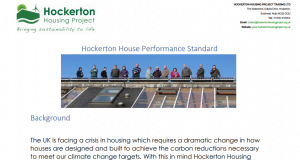Too hot to cool – can nuclear cope?
Will nuclear power save the day? Should we include nuclear energy in our future energy mix? I read today that these power plants do not cope well in hot weather which rather implies with a warming world they are not part of the solution. The Good Energy Market Update reports as follows, in the August heatwave.
France is not fairing much better than neighbouring countries, as their supply of nuclear fleets decreases even further. France relies on nuclear power, but these facilities require water for cooling. The heatwaves have meant that water is too hot to be used for cooling, meaning some plants must limit their running time. This is a further blow to the UK which typically imports excess power from France.
In Hockerton we use wind turbines and photovoltaic power to generate our energy.
I am moving on from my lecturing duties at Nottingham Trent University. There is now an opportunity for someone to take on this fulfilling role and the universities advertisement for it is below. Click for further the vacancy details. Please contact HHP if you want to discuss my experience of the work. Simon Tilley.
Nottingham Trent University
Hourly Paid Lecturer in Renewable Energy Technologies
Brackenhurst Campus
Job reference: 011117
Location: Brackenhurst Campus
Closing date: 11/12/2022
Salary : See special conditions
Employment type: Hourly paid/casual staff
Team: Environmental Science
School / Directorate : School of Animal Rural & Environmental Sciences
Get directions
Special Conditions: £44.45 per direct teaching hour. This includes the following elements: teaching, preparation and marking of the scheduled programme of work. (A flat rate of £17.78 will be paid for completing one of the above elements of the schedule.)
The School of Animal, Rural and Environmental Sciences is an exciting multi-disciplinary environment for learning, teaching and research. We are seeking hourly paid lecturers for a range of courses within the Environmental Science Department. Our portfolio of undergraduate and postgraduate courses comprises subjects such as Horticulture, Geography, Conservation, Food Science and Environmental Science.
We are seeking to appoint an Hourly Paid Lecturer in the following area:
Renewable energy and energy policy
In addition to appropriate knowledge and experience, you should possess excellent communication and presentation skills and a willingness to contribute flexibly to teaching and associated duties on undergraduate courses in this area.
We need skilled lecturers to support students through delivery of a range of courses. You will work under the direction of the Head of Department and Course Leaders to deliver high quality teaching and learning to undergraduate students. Duties will include preparation, delivery and marking of work. You will be expected to deliver lectures and practical sessions, seminars and tutorials and may be asked to contribute to other areas of the School’s activities.
You will be able to demonstrate excellent interpersonal skills and have the ability to communicate ideas of a complex or technical nature to students effectively using a variety of teaching methods, have detailed knowledge of the particular subject area through significant teaching, and / or relevant industry experience.
If you have any specific queries in relation to these positions, please contact: Julia Davies 0115 848 5242
Interviews: Given the nature of these roles, interviews will take place throughout the year. The Head of Department or nominated colleague will be in touch following the submission of your application.
Please note this role does not meet the UK Border Agency requirements for sponsorship. The University is unable to apply for sponsorship for any applicant not eligible to work in the UK and therefore we cannot progress applications from candidates who require sponsorship under the Points Based Immigration System.
Renewable Energy HPL JD & PS
United Nations Secretary-General António Guterres speaks out, the latest Intergovernmental Panel on Climate Change (IPCC) report “a litany of broken climate promises” showing the world is “on a fast track to climate disaster.” 4th April 2022
The verdict is damming
Broken Climate polices
On track to an unliveable world.
Extinction of a million species.
Current energy policies double 1.5 degrees
Results catastrophic – perilously close to tipping points
Governments are adding fuel to flames by investing in fossil fuels
Main prob growing emission gap
We need to drop emissions by 45% this decade, current pledges lead to 14% increase.
Dangerous radicals are the countries increasing production of fossil fuels – Investments in these are madness.
Hard to hear and take this in. Perhaps we can offer a glimmer of hope at Hockerton Housing Project. Join our Master Class on low energy housing.
I feel that protesting is our duty to get our government to react appropriately to this clear call from the UN chief. See you on the streets from the 9th April.
Simon Tilley
Read his full speech here on the IPCC report
Master Class : The practicalities of
delivering zero carbon homes
Our Master Class is a one day fully catered training day to really help you get into the nitty gritty of how to build our type of houses. CLICK HERE TO BOOK
Who should attend
This event will be of particular interest to developers, self-builders, landowners, planners, architects, buildings services engineers, and other building professionals.
Why you should attend
Delegates will gain:
- An overview of government targets for zero carbon homes and standards to meet.
- An understanding of the impact of these targets for future development and what are the key principals for delivery of zero carbon homes.
- Understanding of how to build the Hockerton House
- Insight of the practicalities of achieving zero carbon housing.
- An understanding of strategies and technologies that can be deployed.
- Knowledge of diverse solutions for delivering a zero carbon or autonomous development including renewable energy technologies, and water systems (collection and waste), and how they can be incorporated into buildings.
- An insight into what it is really like to live in zero carbon homes and to live sustainably.
If you are considering booking for multiple people Contact us to book.
More information and timetable.
CLICK HERE TO BOOK
What people say:
Another wonderful, stimulating Master Class at Hockerton! Simon, Nick and
Deb, you put on an excellent day of top-line tutorial on cost-effective
autonomous house design and construction, which, in its fundamental
science can be applied to a whole range of house and building types. You
are aware that I was commissioned in 2008 to project manage a PPS7 type
house (now a para 79 house, under the current NPPF). I asked my
commissioned architect to attend one of your then Master Classes with me;
she applied the science of Hockerton to our project (a stunning stone-faced
mansion of 17,000 sq feet), which was designed (and audited) to perform,
together with all its services, to Hockerton standards. As a result of this, our
project application was passed by the Planning Committee 13 to 1 in favour
and only the second such house in history to be passed without going to
appeal.
Nick Woolley February 2020
New homes and buildings in England will have to produce significantly less CO2 under new rules announced by the government to help the country move towards net zero. Published 15 December 2021
Who says: Department for Levelling Up, Housing and Communities and Eddie Hughes MP
- Changes to building regulations will help UK deliver net zero
- New homes will have to produce around 30% less CO2
- Important step for industry ahead of Future Homes and Buildings Standard in 2025
New homes and buildings in England will have to produce significantly less CO2 under new rules announced by the government in December 2021 to help the country move towards net zero.
Under the new regulations, CO2 emissions from new build homes must be around 30% lower than current standards and emissions from other new buildings, including offices and shops, must be reduced by 27%.
Heating and powering buildings currently makes up 40% of the UK’s total energy use.
Installing low carbon technology, such as solar panels and heat pumps, and using materials in a more energy efficient way to keep in heat will help cut emissions – lowering the cost of energy bills for families and helping deliver the UK’s climate change ambitions.
All new residential buildings, including homes, care homes, student accommodation and children’s homes, must also be designed to reduce overheating, making sure they are fit for the future and protect the most vulnerable people. Improvements to ventilation will also be introduced to support the safety of residents in newly-built homes and to prevent the spread of airborne viruses in new non-residential buildings.
The changes announced to the government’s Building Regulations, which set the standards in England for the design, construction and alteration of buildings, follow a public consultation and will come into effect from June 2022.
They will raise standards and are an important step towards a cleaner greener built environment, paving the way for the Future Homes and Buildings Standard in 2025, which will mean all future homes are net zero ready and will not need retrofitting.
Housing Minister Eddie Hughes said:
Climate change is the greatest threat we face and we must act to protect our precious planet for future generations.
The government is doing everything it can to deliver net zero and slashing CO2 emissions from homes and buildings is vital to achieving this commitment.
The changes will significantly improve the energy efficiency of the buildings where we live, work and spend our free time and are an important step on our country’s journey towards a cleaner, greener built environment.
Further information
Alongside amendments to the Building Regulations, there are 5 new Approved Documents:
There will be a 6 month period before the new regulations come into force on 15 June 2022. Transitional arrangements are in place which mean that if a building notice, initial notice, or full plans for building work are submitted to a local authority before 15 June 2022, then provided the building work commences by 15 June 2023, work on that individual building is permitted to continue under the previous standards.
As well as setting out measures for the 2021 uplift to the Building Regulations, the government response to the Future Buildings Standard consultation also sets out plans for the implementation of the Future Buildings Standard from 2025. This includes plans to start a full technical consultation on the FBS in 2025.
How to meet this uplift building standard? Come and see at Hockerton Housing Project.







